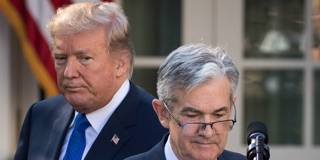For decades, the freedom of monetary policymakers to make difficult decisions without having to worry about political blowback has proven indispensable to macroeconomic stability. But now, central bankers must ease monetary policies in response to populist mistakes for which they themselves will be blamed.
CHICAGO – Central-bank independence is back in the news. In the United States, President Donald Trump has been berating the Federal Reserve for keeping interest rates too high, and has reportedly explored the possibility of forcing out Fed Chair Jerome Powell. In Turkey, President Recep Tayyip Erdoğan has fired the central-bank governor. The new governor is now pursuing sharp rate cuts. And these are hardly the only examples of populist governments setting their sights on central banks in recent months.

CHICAGO – Central-bank independence is back in the news. In the United States, President Donald Trump has been berating the Federal Reserve for keeping interest rates too high, and has reportedly explored the possibility of forcing out Fed Chair Jerome Powell. In Turkey, President Recep Tayyip Erdoğan has fired the central-bank governor. The new governor is now pursuing sharp rate cuts. And these are hardly the only examples of populist governments setting their sights on central banks in recent months.